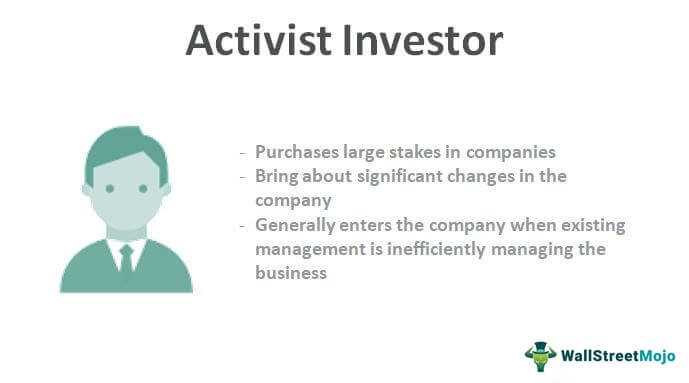Activist Investor: Definition, Role, Biggest Player
An activist investor is an individual or group that acquires a significant stake in a company with the intention of influencing its management and operations. These investors typically take an active role in the company, using their ownership position to advocate for changes that they believe will increase shareholder value.
Definition

An activist investor is a type of investor who seeks to bring about change in a company by using their ownership position to influence its management and operations. They often take a more hands-on approach than traditional investors, actively engaging with the company’s management team and board of directors to push for changes that they believe will improve the company’s performance and increase shareholder value.
Activist investors can take various forms, including hedge funds, institutional investors, or individual investors. They typically acquire a significant stake in the company, usually at least 5% of its outstanding shares, in order to have the necessary influence and leverage to enact change.
Role
The role of an activist investor is to identify underperforming companies and advocate for changes that will unlock their potential value. This can involve a range of tactics, including engaging in dialogue with management, proposing changes to the board of directors, or even launching proxy battles to gain control of the company.
Activist investors often have a specific agenda or set of demands that they believe will improve the company’s performance. This can include measures such as cost-cutting initiatives, changes to the company’s strategic direction, or even a sale or merger of the company. The ultimate goal is to maximize shareholder value and generate a positive return on their investment.
While activist investors are sometimes viewed as disruptive or confrontational, they can also bring about positive change within a company. By challenging the status quo and advocating for improvements, they can help to drive innovation, increase efficiency, and create value for all shareholders.
Biggest Player

One of the biggest players in the activist investing space is Carl Icahn. Icahn is a billionaire investor and activist known for his aggressive approach to investing. He has a long history of taking large positions in companies and pushing for changes to unlock value.
Icahn has been involved in numerous high-profile activist campaigns, including his successful efforts to push for changes at companies such as Apple, eBay, and Netflix. His activism has often resulted in significant changes to the companies’ strategies, management teams, and shareholder returns.
While Icahn may be one of the most well-known activist investors, there are many other players in the space who have also made a significant impact. These include hedge funds such as Third Point, Pershing Square, and Elliott Management, as well as institutional investors like BlackRock and Vanguard.
Overall, activist investors play a crucial role in the financial markets by challenging underperforming companies and advocating for changes that can unlock value. While their tactics may be controversial at times, their efforts can lead to positive outcomes for shareholders and the broader economy.
What is an Activist Investor?
An activist investor is an individual or group that purchases a significant amount of shares in a company with the intention of using their ownership position to influence the company’s management and decision-making process. Activist investors typically seek to bring about changes in the company’s strategy, operations, or corporate governance to increase shareholder value.
Characteristics of an Activist Investor
Activist investors are often characterized by their proactive approach and willingness to challenge the status quo. They are typically well-informed and conduct extensive research on the companies they target. They may also have a specific agenda or set of demands that they believe will enhance the company’s performance.
Activist investors can take various forms, including hedge funds, institutional investors, or individual investors. They may hold their shares for a short period or for an extended period, depending on their objectives and the progress they make in achieving their goals.
Strategies of Activist Investors
Activist investors employ a range of strategies to achieve their objectives. Some common strategies include:
- Proxy Battles: Activist investors may seek to replace existing board members with their own candidates through a proxy battle. This allows them to gain control of the company’s decision-making process.
- Shareholder Proposals: Activist investors may submit proposals to be voted on by shareholders at the company’s annual general meeting. These proposals can cover a wide range of issues, such as executive compensation, corporate governance, or strategic direction.
- Engagement with Management: Activist investors may engage directly with the company’s management team to express their concerns and propose changes. This can involve private meetings, public letters, or media campaigns to put pressure on the company.
- Public Activism: Activist investors may take their concerns public by speaking to the media or making public statements about the company’s performance. This can help to raise awareness and rally support from other shareholders.
Overall, activist investors play an important role in corporate governance by holding companies accountable and pushing for changes that they believe will benefit all shareholders. While their tactics can be controversial, they have been successful in driving positive change in many cases.
The Role of an Activist Investor
An activist investor is an individual or group of individuals who purchase a significant stake in a company’s shares with the goal of influencing the company’s management and operations. The role of an activist investor is to advocate for changes within the company that they believe will increase shareholder value and improve the company’s overall performance.
Activist investors typically take an active approach in their investments, engaging with company management, other shareholders, and the public to push for their desired changes. They may use various tactics such as public campaigns, proxy battles, and shareholder resolutions to make their voices heard.
Key Objectives of an Activist Investor
- Unlocking Value: Activist investors often believe that a company’s stock is undervalued and can be worth more if certain changes are made. They may push for actions such as cost-cutting measures, asset sales, or changes in corporate structure to unlock this hidden value.
- Improving Governance: Activist investors may advocate for changes in the company’s board of directors or executive team to improve corporate governance practices. They may push for more independent directors, increased transparency, or better alignment of executive compensation with shareholder interests.
- Strategic Direction: Activist investors may seek to influence the company’s strategic direction by advocating for changes in business strategy, mergers and acquisitions, or divestitures. They may believe that the company should focus on certain markets or products, or that it should exit certain businesses altogether.
- Shareholder Returns: Ultimately, the main objective of an activist investor is to generate positive returns for themselves and other shareholders. They believe that their proposed changes will lead to improved financial performance and increased shareholder value.
While activist investors can sometimes be seen as disruptive or confrontational, they play an important role in corporate governance by challenging the status quo and holding management accountable. Their actions can lead to positive changes within companies, benefiting both shareholders and the broader economy.
The Biggest Player in Activist Investing
Who is Carl Icahn?
Carl Icahn is an American businessman and investor who has been actively involved in the financial markets for several decades. He started his career as a stockbroker in the 1960s and went on to establish his own investment firm, Icahn Enterprises, in 1987.
Icahn is known for his aggressive investment strategies and his ability to influence the management and direction of the companies he invests in. He has a reputation for taking large stakes in underperforming companies and pushing for changes that he believes will increase shareholder value.
Notable Activist Investments
Over the years, Carl Icahn has been involved in numerous high-profile activist investments. Some of his notable investments include:
| Company | Year | Outcome |
|---|---|---|
| Apple Inc. | 2013 | Icahn pushed for a larger share buyback program, resulting in a significant increase in the company’s stock price. |
| eBay Inc. | 2014 | Icahn called for the spinoff of eBay’s PayPal division, which eventually led to the division becoming a separate publicly traded company. |
| Xerox Corporation | 2018 | Icahn pushed for a change in leadership and a strategic review of the company, leading to a merger with Fujifilm being called off. |
These are just a few examples of the many successful activist investments that Carl Icahn has made throughout his career.
Overall, Carl Icahn’s track record as an activist investor speaks for itself. His ability to identify undervalued companies and implement changes that unlock shareholder value has earned him a reputation as one of the most successful and influential investors in the world.

Emily Bibb simplifies finance through bestselling books and articles, bridging complex concepts for everyday understanding. Engaging audiences via social media, she shares insights for financial success. Active in seminars and philanthropy, Bibb aims to create a more financially informed society, driven by her passion for empowering others.
